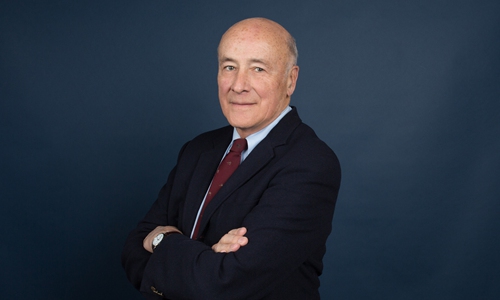Respect for science will win COVID-19 fight
Source:Global Times Published: 2020/4/29 16:18:40

Joseph Nye Photo: Courtesy of Nye
Editor's Note:The coronavirus pandemic has continued to rock the world and seen heated rivalry between China and the US on all fronts. In a recent article in the National Interest, renowned American political scientist Joseph Nye (Nye) stressed the importance of cooperation between the US and China. How can the two countries come together to cooperate on the common enemy of humanity? What impact will the pandemic have on world order? Global Times (GT) correspondent Lu Keli discussed these issues with Nye.
GT: You have witnessed and experienced various global crises. What do you think of the ongoing COVID-19 crisis? What lessons do you think we should learn from this public health crisis?
Nye: It is important to remain calm and analytical and to respect science. The 9/11 crisis led to great fear and the overreaction led to the mistaken invasion of Iraq. As Franklin D. Roosevelt said in the economic crisis of 1933, we have nothing to fear but fear itself.
GT: In your article "Why the Coronavirus Is Making U.S.-China Relations Worse" published on nationalinterest.org, you stressed the importance of cooperation between the US and China. Do you have any specific suggestions for China-US cooperation?
Nye: As I argue in my new book Do Morals Matter? Presidents and Foreign Policy from FDR to Trump, there is no way either of our countries can deal with transnational challenges like pandemics or climate change acting alone. We need to learn more about power with others, not just power over others. The US and China developed good cooperation after the SARS epidemic, and we should restore and enhance that with cooperative scientific-medical projects.
GT: Some people are worried that this epidemic will be an inflection point of globalization, and the world moves toward grid. Do you agree?
Nye: Yes, even if economic globalization is slowed by the pandemic and other events, ecological globalization will continue. It is driven by changes in the technology of transportation and communication which will not stop.
GT: While China sent medical teams to countries and regions around the world, provided material assistance and shared anti-epidemic experience and lessons, some become very worried and nervous. They are fearful that China's aid may be "public opinion warfare." What is your take on this?
Nye: China is trying to change the narrative of the first months of its mishandling of the epidemic, and that is understandable. But it also makes others suspicious of China's motives. The more such actions are seen as propaganda, the less successful they will be in producing soft power. I have often said the best propaganda is not propaganda.
GT: This epidemic is a test of the hard power and soft power of all countries. Do you predict that the soft power of the US and the European Union will be affected as the epidemic develops or after it ends? What about China's?
Nye: The US, Europe, and China have all lost soft power because of their inept early responses to the crisis. Denial was damaging. On the other hand, we are still in the part of a play with many acts, and it remains to be seen how the play will end. In 1918, the second wave of influenza was more lethal than the first.
GT: China has delivered an image of efficient mobilization, collective action and international solidarity to the world in the fight against the epidemic. How does China contradict to the US?
Nye: China seems to have recovered its endurance after a rocky start; the Trump administration is still faltering because of the vacillating leadership of the president. This may change after the November election. American civil society remains strong.
GT: What is the most important capacity for a country to have in dealing with the COVID-19 crisis?
Nye: Francis Fukuyama recently wrote an article titled "The Thing That Determines a Country's Resistance to the Coronavirus," emphasizing the role of a state's capacity and prestige in the fight against epidemic. "The major dividing line in effective crisis response will not place autocracies on one side and democracies on the other." I think Fukuyama makes good points. The key to success is trust, not the type of political system. Some democracies have done well; others have not. Some authoritarian systems have been successful; others have not.
Posted in: VIEWPOINT